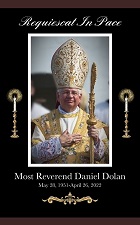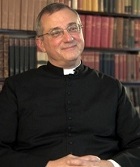The Catholics should have nothing to do with Heretics
Some readers interpret my articles as an attack on the adherents of “The Thesis of Cassiciacum”, and say that there is no need to mention specific names, because it is a scandal.
So I want to clarify my position again.
According to Moral Theology, scandal, in the proper sense, is unbecoming words or conduct that are an occasion for another’s spiritual ruin.
“146. – 2. Actions good in themselves, which do not have appearance of evil, but which, nevertheless, give others occasion to sin, need not be omitted if the omission means great inconvenience.”
“3. The observance of a positive law may be omitted to avoid scandal. Ordinarily, however, one is not obliged to do this.”
“4. Actions which are wrong in themselves may never be done to avoid scandal.
It is not lawful to deny one’s faith in order to avoid giving another an occasion to ridicule it…” (Moral Theology, by REV. HERIBERT JONE, pp. 85, 86)
Therefore, one can say that a public, balanced and sufficiently argumented theological discussion does not give others occasion to sin as long as offensive language is not used against adherents of a different idea or a teaching. Personally, I try not to use such language. But since English is not my first language, I often find it difficult to find the right word or expression. If my words offend anyone, then I apologize.
Mentioning certain persons does not mean attacking them. I name some adherents of the "Thesis" so that readers can see the sources to which I refer and my comments on them. I personally know some of these priests, and I can say that they are quite educated people who have tens of thousands of volumes of pre-Vatican II Catholic authors in their possession. I am in no way accusing them of lack of good will.
Also, I want to emphasize that I am not conducting a "war polemic" with them, as some say, but, referring to pre-Vatican II Catholic authors, and believing that the principle of epikeia can be used in our circumstances, I am simply presenting my vision of the "Thesis" with the eyes of a "man from the east". Having been a Catholic priest for more than thirty years (see PS), I not only have the right, but also the duty to say something on this topic. Although I believe that my position is logically and theologically argued, I in no way claim to be infallible.
So, once again, I'm going to share with you a new "portion" of my reflections on this topic.
The more I read the explanations of "The Thesis of Cassiciacum" by Most Holy Trinity Seminary Faculty, the clearer it becomes that it is a theological error, which cannot be a solution for the restoration of the Papacy. The "Thesis" rather, does the job of dividing traditional Catholics into opposing groups. Also, the “Thesis”, in my opinion, can be compared to so-called vaccines which do not help the body, but only harm it, and more and more people are gradually beginning to realize this.
Trying to justify acts of jurisdiction by Vatican II “material popes”, such as designation of bishops and electors of the pope and changing the rules of election, adherents of “The Thesis” like to cite pages 83 and 91from the book THE DELICT OF HERESY by REVEREND ERIC F. MACKENZIE where the author speaks about acts by sentenced and un-sentenced heretics.
On pages 83 and 84 REV. ERIC F. MACKENZIE speaks about the administration of the Sacraments by heretics:
"1. The occult heretic; he is bound in conscience to avoid the exercise of jurisdiction until he has been absolved; but may licitly and validly act when such actions are necessary, either to avoid infamy (canon 2232), or when requested even implicitly by the faithful; save for these exceptions, he acts validly, but illicitly.
2. The public heretic, who has not yet been restrained by his Bishop or by judicial sentence: his acts of jurisdiction are valid, but illicit, except when requested by the faithful.
3. The sentenced heretic: his acts are both invalid and illicit, except in the one case when he is requested to act by a dying Catholic.
This last case is rare, but may be briefly reviewed. If a dying Catholic wishes to receive the Sacraments, for the peace of his conscience and (if the Sacrament be Matrimony) for the legitimation of offspring, any priest, even a vitandus, is fully empowered by the Church to act in her name. Hence he may administer the Sacrament of Penance, and therewith exercise jurisdiction and grant absolution from any sin or censure whatsoever.21 [21 Canon 882]. Canon 2261, §3, permits a Catholic who is in danger of death to seek and receive the Sacrament of Penance from even a sentenced heretical priest, even if there are present or available other priests in good standing, possessed of faculties for the administration of this and other Sacraments. This is a favor extended to the Catholic in what may be the last moments of his life, and is designed to remove any difficulty or repugnance which he might feel toward the Sacrament of Penance, if he could only receive it from the approved priest." p. 83
As you see the Canons mentioned by the author say nothing about the designation of bishops and electors of the pope, or making laws by “material popes”. Therefore, this part cannot be applied to "material popes" in those matters.
Also, these canons cannot be used now for the following reason: Novus Ordo “bishops”, installed according to the invalid rite of “Paul VI”, are not valid bishops and are not ordinaries; and Novus Ordo “priests” are not valid priests for the same reason. In other words, these canons cannot be applied to laymen.
On page 91 REV. ERIC F. MACKENZIE speaks about the acts of elections, appointments to offices, acceptances of offices, etc:
"Canon 2265, §1, n. 1, prohibits all excommunicates, - and therefore all heretics, - the exercise of any right to elect, present, or nominate others to ecclesiastical positions. This prohibition makes all such actions illicit. The second number of this canon decrees that when the delinquent is vitandus or even toleratus post sententiam, his action is invalid in these matters. Hence sentenced heretics cannot validly share in any way in the filling of Church offices. Furthermore, if a person otherwise qualified to act has been guilty of a delict of heresy, and if he is challenged on this ground in advance of action to fill a Church office, he may be subjected to a declaratory sentence on the basis of his delict, and thus rendered incapable thereafter of sharing in the process of filling the office. If however such an individual has already acted, by voting with others for a candidate, the election will be held valid, unless it be clearly evident that if he had not voted, the successful candidate would not have received sufficient votes for election, or unless the other voters knowingly allowed him to vote, with full consciousness of his incapacity.57 [57 Canon 167, §2; cf. c. 25, 2C, X, de electione, I, 6].
The second section of this same canon states that heretics and other excommunicates cannot acquire any ecclesiastical dignity, office, pension, or other charge, even by the action of others. This legislation is further qualified to indicate that unsentenced heretics are only illicitly placed in office, while sentenced heretics whether tolerati or vitandi, are invalidly elected or appointed, and do not receive the office at all." p. 91
These canons also cannot be applied because during the current Sede Vacante, there is no ecclesiastical authority which has the power to issue a sentence to a public heretic who is a valid bishop or a priest. Of course, we agree that it is a very big problem.
However, although public heretics’ separation from the Catholic Church has not been legally declared, this does not mean that they are innocent before law, as adherents of the “Thesis” say.
On page 43 of the THE DELICT OF HERESY, the author, REV. ERIC F. MACKENZIE, explains that “the heretic immediately incurs excommunication, and is liable to further vindictive punishments:
"The heretic immediately incurs excommunication, and is liable to further vindictive punishments. The reason is plain. Heresy indicates such a destruction of the Christian character of the delinquent, and, being externalized, has such potentialities of hindering and preventing the teaching of revealed truth to others, that immediate and decisive action must be taken to prevent any spread of the contagion of error.
All this may sound strange in an age of religious indifference, when even Catholics are apt to give more attention and care to morals than to faith; but it is the logical and necessary consequence of the possession of God’s revealed and final truth, and as such is justified in the judgment of all save those who would deny the existence of such truth, or its importance. It is as an application of these principles that the Church punishes the delict of heresy in its various forms. And, considering first the delict of simple heresy, the Church decrees:
"Omnes a Christiana fide apostatae et omnes et singuli haeretici aut schismatici incurrunt ispo facto excommunicationem.”3 [3 Canon 2314, § 1, n. 1.]" p. 43
“Immediately incurs excommunication” i.e., ipso facto, BUT “and is liable to further vindictive punishments” requires issuing of a sentence by a higher ecclesiastical authority, a Pope, a Bishop, a court etc.
Whether they like it or not, adherents of the “Thesis”, together with those whom they call “totalists”, are referring to Canon 2314, § 1, n. 1, which says that all and every heretic (omnes et singuli haeretici) incur excommunication ipso facto.
When we publicly say that someone is a heretic, while he is yet unsentenced by a Church authority, we should be sure that our public judgment is either confirmed by a sentence issued by a Church authority, or by the Law itself.
Therefore, publicly saying that this or that “material pope” is a heretic, the “Thesis” adherents, together with “totalists”, demonstrate confidence that their outward judgment is based on the Law.
However, if they constantly emphasize that a "material pope", an unsentenced heretic, is innocent before Law, they judge him unfairly based not on the Law, but on their personal judgment, and this makes them guilty, because they publicly judge an "innocent person".
Moreover, if they refuse to obey him, whom they call "innocent before law material pope” who is “in possession of a valid election to the Papacy”, who “can designate bishops and electors of the pope and change the rules of election”, they, therefore, commit a sin of a schism, at least.
Also, by calling a heretic a person whom they recognize as a "validly elected material pope", they manifest their public rejection of the "valid election" performed by the "the legal body of electors", as they call it.
If they constantly repeat that "the Church is not a mob. It operates according to law" (I do agree) and that "material hierarchy" did not found a Novus Ordo church, they, therefore, must either: 1) obey him whom they call "validly elected" and who is “in possession of a valid election to the Papacy”, and is "innocent before the law", because “he has not been sentenced by a competent Church authority”, or 2) they must disobey him, since he is excommunicated ipso facto, as it is prescribed by the Law for omnes et singuli haeretici.
In a word, it seems that the “Thesis” lacks even elementary logic.
Now let us compare the positions of Fr. Anthony Cekada and Bp. Donald Sanborn on the attitude of Catholics towards public heretics. I think that reading Bishop Sanborn’s answers, some of you will be very surprised.
Fr. Anthony Cekada:
Resisting the Pope, Sedevacantism and Frankenchurch:
“(3) Who Decides This? The answer is simple: The same people who “decided” that the New Mass was evil and that the Vatican II teachings were non-Catholic - you and me, folks. We didn’t need a General Council to figure out those issues and we don’t need a General Council for this one either. After all, do we traditional Catholics await a jury verdict before we decide that the local abortionist is a murderer? He openly violates a Commandment. He commits the sin of murder, and we don’t hesitate to say so - even though no court has convicted him. So too, the public heretic. He aborts an article of the Creed to create a monster. He openly denies the rule of faith. He commits the sin of heresy. We traditionalists need not hesitate to call a heretic a heretic - even though no Council has convicted him - any more than we hesitate to call an abortionist a murderer. Nor should traditionalists hesitate to point out the consequences: A public heretic cannot be a true pope. He deposes himself.”
Bergoglio's got nothing to lose:
“The sedevacantist thesis arose from a need to explain how Paul VI, whom everyone at first recognized as a true pope when he was elected in 1963, could have used papal authority to promulgate doctrinal errors and evil laws.
The answer, as we now know, was to be found in a principle repeatedly laid down by pre-Vatican II theologians and canonists: A pope who became a public heretic automatically lost his office and papal authority. The principle applied on all fours to Paul VI, so one had a coherent explanation.
But what of his successors? Initially, many trads did not know exactly what to expect from John Paul I and John Paul II. (Believe it or not, the internet did not exist in those days, and information was hard to come by …) So sedevacantists tended to apply to both men the same theological principle they had previously applied to Paul VI — that is, the loss of office (authority) by a heretical pope who had validly obtained it.
In the 1990s, my own research into this question, first presented in "Traditionalists, Infallibility and the Pope", turned up many quotes to support this principle. At the same time, I encountered another theological twist: Not only did a public heretic cease to be pope, but also a public heretic could not become pope in the first place.”
“This general principle of divine law is even found in an ecclesiastical law promulgated by Pope Paul IV (1555–1559), who suspected that a cardinal who was a likely candidate for the papacy in the next conclave was in fact a secret heretic.
On 16 February 1559, therefore, Paul IV issued the Bull Cum ex Apostolatus Officio. The pontiff decreed that if ever it should ever appear that someone who was elected Roman Pontiff had beforehand “deviated from the Catholic faith or fallen into any heresy,” his election, even with the agreement and unanimous consent of all the cardinals would be “null, legally invalid and void.”
So the possibility that a conclave could elect a heretic is not some post-Vatican II sedevacantist fantasy. A real pope actually promulgated a law to prevent this possibility. And his decree laid down the same principle which the canonists quoted above said was divine law: a heretic cannot be validly elected pope.”
Bishop Donald Sanborn:
"19. Were there any parallel cases in history?
The Catholic Patriarch of Constantinople in 428 A.D. espoused the heresy that Our Lady was not the Mother of God. After he preached this from the pulpit, the Catholic people would have nothing to do with him, would not attend his Masses, and said, “We have an Emperor, but no bishop.” And this was before he was officially excommunicated by the Church. While this case concerns a bishop and not a pope, the principle is the same: the promulgation of heresy is incompatible with the possession of the authority of Christ over the flock. If it was true for this bishop Nestorius, it is all the more true for him who has the care of the whole flock.
20. Did any Pope ever warn us about a heretic on the throne of Peter?
Pope Paul IV in 1559, fearful lest a Protestant be elected to the papal throne, decreed that if the person elected the Pope should have deviated from the Catholic Faith or fallen into any heresy, his election shall be considered null, legally invalid, and void. He furthermore decreed that such a person must not be considered the pope, even if he took possession of the office, was enthroned, and received the veneration and obedience of all the faithful.” p. 4
The full text of Bp. Sanborn’s article can be found here: traditionalmass.org
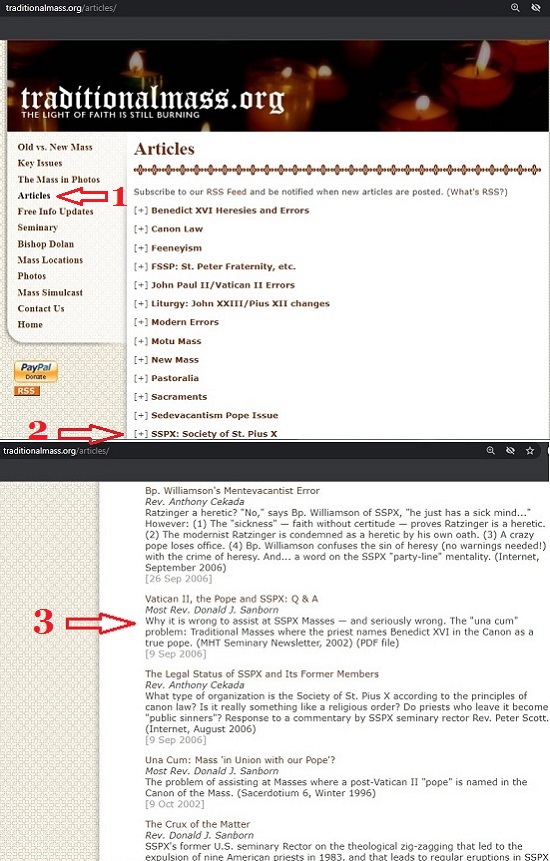
So, you can see that Bishop Sanborn agrees with Father Cekada, as well as with all bishops and priests whom he calls "totalists".
If someone says that the Code of 1917 abolished the Law issued by Pope Paul IV, this is not entirely true. Canon 1556 says: "Prima Sedes a nemine iudicatur" (The First See is subject to no one’s judgment), while Pope Paul IV’s Bull was directed against a heretic who pretended to become a pope by election, but he didn't become pope. Paul IV decreed that such a person could be judged by the Church, because he was not a Pope.
Today we speak about persons who were or are heretics, and whose elections should be treated according to Pope Paul IV’s Bull, and not according to Canon 1556. From the above Bishop Sanborn’s explanation, it is clear that he agrees with Pope Paul IV. Great!
I believe that Most Holy Trinity Seminary was founded taking into account exactly this canonical principle, which can be found in the Bull Cum ex Apostolatus Officio, issued by Pope Paul IV on 16 February 1559, and in Canon 2314 of the Codex of 1917 A. D.
How can the foundation of the Most Holy Trinity Seminary be canonically justified if not on the basis of Pope Paul IV's Bull and Canon 2314?
But if the Faculty of Most Holy Trinity Seminary now publicly says that all Vatican II “material popes” are “legal members of the Church”, are “innocent before law”, “have right to designation of bishops and electors of the pope and changing the rules of election”, then there is not a legal justification for the foundation and existence of this Seminary, because the rector of the Seminary was not designated by a “material pope”.
Let us see what is written on the Most Holy Trinity Seminary site:
“Most Holy Trinity Seminary is organized as a center for the training of Roman Catholic priests according to pre-Vatican II standards. The sole motive of its foundation and purpose of its functioning is to preserve the Roman Catholic priesthood, not only with regard to the validity of Holy Orders, but also with regard to the orthodoxy and proper training of Roman Catholic priests. The need for such a seminary is dictated by the doctrinal, liturgical, and disciplinary devastation which has been wrought in countless souls as a direct result of Vatican II and its subsequent changes.”
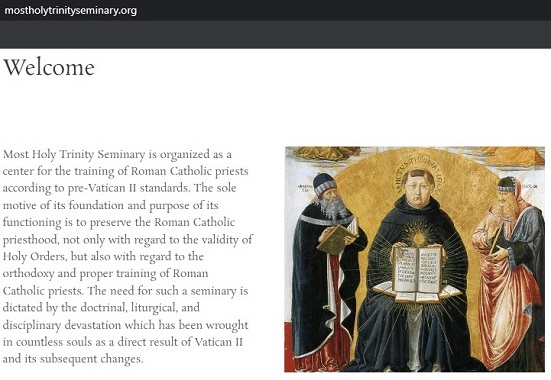
Also, on the page Principles you can read this:
“The Seminary offers as its legal justification for its existence, and of the apostolate of those priests who shall emanate from the Seminary, the principle of epicheia. In the absence of the lawmaker, i.e., a true Pope, one may reasonably presume that it is the will of the Church, and therefore lawful and even required of the faithful, especially the clergy, to carry on the mission of the Church to save souls. And since this can only be done by the offering of the Holy Sacrifice of the Mass and the distribution of Sacraments, it is required that the clergy make every effort to accomplish this end.”
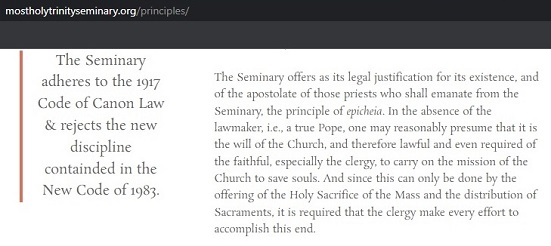
If the Seminary proposes the preservation of the Roman Catholic Priesthood, regardless the “Thesis”, isn't this proof that the Seminary actually believes that continuity of the Catholic Hierarchy does not depend on the Novus Ordo “material hierarchy” and particularly on the “material popes”?
If that is the case, and we see that this is indeed the case, then why is this useless "Thesis", which brings confusion and divisions between traditional Catholics, needed?
Also, recently, in December 2021 (SUPPLEMENT TO THE DECEMBER NEWSLETTER), Bishop Sanborn once again repeated a self-contradictory statement:
"Finally, totalist sedevacantists do not give any explanation of how apostolicity is saved in their system, which is a glaring flaw. For apostolicity is also a dogma of Faith. Somehow, in this time of the apostasy of the hierarchy, we must be able to account for the continuity of apostolic succession until the end of time. As I always say, if the totalists have a better explanation than what we propose, we are listening."
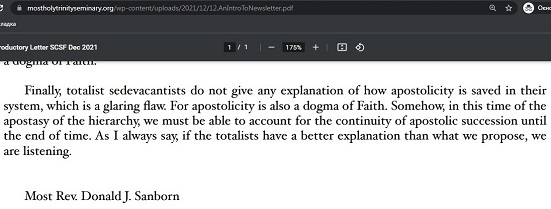
While the official website of Most Holy Trinity Seminary says that “The sole motive of its foundation and purpose of its functioning is to preserve the Roman Catholic priesthood, not only with regard to the validity of Holy Orders, but also with regard to the orthodoxy and proper training of Roman Catholic priests”, and “In the absence of the lawmaker, i.e., a true Pope, one may reasonably presume that it is the will of the Church, and therefore lawful and even required of the faithful, especially the clergy, to carry on the mission of the Church to save souls”, the rector of this Seminary says that he wants to listen to a better explanation than the Seminary proposes.
Also, if by the term “totalist sedevacantists” His Excellency means Catholics who recognize the Vacancy of the Apostolic Throne, then they are completely right in saying that the Vacancy means totally vacant. There is either Sede Plena, when the Throne of St. Peter is occupied by one of his successors, a Pope; or Sede Vacante, when the Throne of St. Peter is empty. St. Peter's Throne cannot be "semi-plena" or "semi-vacant", as the "Thesis" is trying to impose on us.
Some conclusions
Moral Theology says that the transgression of a Divine law or every law, in a sense a derivation from the Divine Law, without knowledge or consent, is a material sin, and that God never imputes a material sin as a fault (see Moral Theology by REV. HERIBERT JONE. 96. Chapter I, SIN IN GENERAL, p. 46).
However, it is not a material sin to be in invincible ignorance while all the Cardinals have died, men who have appearance of Church hierarchy fallen into heresy or apostasy, and most of them are not valid bishops (because they were ordained according to the invalid rite of "Paul VI"), and there is no clear provision in the Law how a Pope can be elected in such circumstances. It is not a sin, therefore, to be in invincible ignorance in such unprecedented circumstances, since there is no transgression of the Law. Administering or receiving the Sacraments in such circumstances is a morally good action.
On the other hand, the deliberate acting as an advocate for an unrepentant, public heretic, who imposes “a dogma-less religion of humanity, which differs essentially from Roman Catholicism” (see Theological Directory of Bishop Sanborn’s Roman Catholic Institute), and is guilty of the spiritual death of hundreds of millions of souls, seems like cooperation in the formal sins of that heretic. Administering or receiving the Sacraments in such case is a morally sinful action. For this reason alone, it is prudent and safe to reject the "Thesis".
Moral Theology says this:
“The Principle of morality or the determinations of the moral act are all those elements of human conduct that have a bearing upon the norm of morality, namely, the object, circumstances and end.
That an action be morally good none of these elements may conflict with the norm of morality.”
(Moral Theology by REV. HERIBERT JONE, O.F.M. CAP., J.C.D., by REV. URBAN ADELMAN, O.F.M. CAP., J.C.D. The Mercier Press Limited, Cork, Ireland, Nihil Obstat: PIUS KAELIN, O.F.M. CAP, Censor Deputatus, Imprimi Potest: VICTOR GREEN, O.F.V. CAP., Provincial, July 2, 1955, Nihil Obstat: RICHARD GINDER, S.T.I., Censor Librorum, Imprimatur: JOHN FRANCIS DEARDEN, D.D., Bishop of Pittsburg, August 15, 1955, p. 16.)
So, during the current Sede Vacante, in the absence of the ecclesiastical legislator for the entire Church (the Pope, as is also a General Council in union with him), practicing the Catholic Faith faithfully, with certain jurisdictional limitations, using the principle of epikeia, is a morally good action.
But, zealously justifying public heretics who strive to destroy the Catholic Church is a morally sinful action.
Fr. V
|




